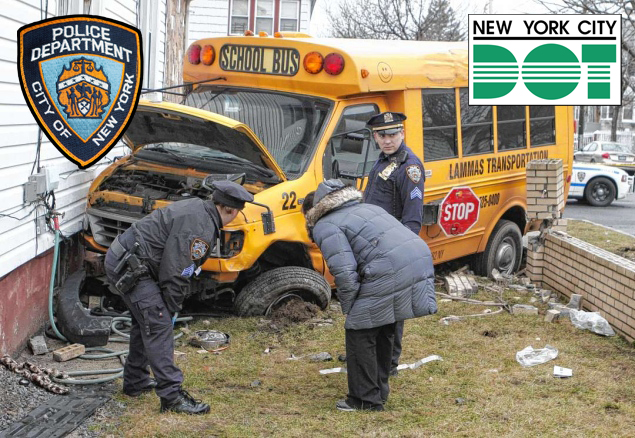
They can't handle the truth — at least not yet.
Under city law passed by the Council earlier this year, the understaffed press shop of the Department of Transportation is required on Jan. 1 to take over the job of informing the media, and by extension, the public, about all fatal crashes — a job currently done by the NYPD office of the Deputy Commissioner for Public Information, which is manned 24 hours a day, seven days a week, 365 days a year.
The office that reporters call by the shorthand "DCPI" currently has more than 40 people taking calls, responding to tweets and answering emails all day and night from reporters and the public, and puts out crash information sheets often within hours of a fatal collision, while fielding all the other calls that a police department must handle. Meanwhile, the DOT currently has two press staffers and at least one social media person, none of whom is regularly available overnight and on weekends, when many crashes occur. More staff is being added, sources said.
In addition, the same city law that put DOT in charge of public response to crashes also made DOT the supervising agency of the NYPD's Collision Investigation Squad, a team of roughly two dozen cops and supervisors that visits roughly 375 fatal and serious crash sites every year.
The CIS rarely brings charges and whose findings have long been criticized by advocates, who say the squad often blames victims and empathizes with drivers. The Council law was written to change the NYPD's approach by having street design experts oversee the work of CIS investigators.
"We wanted to see the crash investigation work transferred to DOT so that each investigation would contribute to the broader work of street safety," said Council Member and Comptroller-elect Brad Lander. "Obviously, you're trying to learn about the road conditions that led to the crash."
Lander had hoped to put the CIS entirely under the DOT's aegis, but the bill was redrafted to make DOT merely oversee the squad, which remains within the NYPD. But the law makes it quite clear that DOT will have a lot more work to do. A new crash investigation and analysis unit "shall have the duty to analyze and report on serious vehicular crashes," according to the law.
"In coordination with the police department, such unit shall have all powers necessary to investigate serious vehicular crashes or any other crash, including but not limited to, inspecting crash sites, documenting vehicle and party positions, measuring and collecting data, interviewing witnesses, and conducting collision reconstructions," it continues.
Forgione said the bill would require DOT to investigate 9x as many crashes per year as NYPD CIS currently investigates. Chief Royster says CIS has 22 detectives, five sergeants and one lieutenant. Every CIS investigators has at least 10 years of service.
— David J. Meyer (@dahvnyc) February 24, 2021
The use of the term "serious vehicular crashes" is also key. Currently, the Collision Investigation Squad only responds to roughly 5 percent of the estimated 4,000 serious and fatal crashes, as Streetsblog has reported. If the DOT follows the law "to investigate, analyze and report on all serious vehicular crashes," it will be responsible for overseeing thousands more investigations.
The DOT does have a small Emergency Response unit and an Investigations team that responds to "major" crashes. The de Blasio administration has set aside $3 million to fund 29 new positions that will allow those units to provide 24-7 response, according to the agency.
And the phrase “report on” is also crucial because currently, CIS reports are not made public, and their findings, such as whether a crash occurred because of some particular road design element that is unsafe, are not routinely passed along to the DOT or to the public. The level of public information may also change, given that the law gives the DOT "the primary responsibility for all public statements, press releases or any other public communications regarding serious vehicular crashes and related investigations."
Can't believe testimony so far at hearing on Intro 2224-2021, the bill to move crash investigation responsibilities from @NYPDHighway to @NYC_DoT. So disappointing to hear the testimony from both agencies, it is full of lies from the NYPD side and full of "not my job" from DoT.
— Steve Vaccaro (@BicyclesOnly) February 24, 2021
The NYPD, which opposed the bill, declined repeated requests for comment about the coming transfer of its public information role or its investigative authority. Police officers will still be required to affect arrests in the event an investigation, a key demand of the city's five District Attorneys, all of whom objected to the original proposal to move the CIS into the DOT.
DOT spokesman Seth Stein said the agency will "have more to say soon."
“We are working closely with the NYPD to determine the best path forward for implementing this law, with an eye towards ensuring implementation does not interfere with criminal investigations or DA prosecution in any way," he added.
The bill also requires the quarterly reports from the DOT that report how many investigations have been completed; provide "all evidence and data" collected in the investigations; detail "any factors that may have contributed to each crash, or increased or mitigated the severity of each such crash"; and recommend "whether changes to street design or improvements to infrastructure could reduce the risk of subsequent serious vehicular crashes" — not only at the crash location itself, but "other similar locations."
None of the above public information is currently provided in that manner by the NYPD or DOT. As such, advocates and even some journalists are confused as to what is going to happen on Jan. 1.
“Since Intro 2224 was enacted in April, we’ve seen too many examples of insufficient investigations and victim blaming to the press that this law could have stopped," said Danny Harris, Transportation Alternatives Executive Director. "As the Jan. 1 deadline approaches for these units to be created, we’re concerned that there will be further delays to long-needed reforms to how NYPD responds to and communicates about crashes."
One veteran New York City reporter, who requested anonymity in name and gender because they often deal with both agencies, predicted a disaster.
"It's going to be terrible," they said. "The Transportation Department has never put out information the way the NYPD has, though, of course, the NYPD doesn't even do it very well. Still, they're available at 4 in the morning. My hope is that the PD will still put out the preliminary sheet from the scene so that reporters can get started on their stories, but hope can't be a substitute for policy."
Moving crash investigation from NYPD to DOT -- as part of a data-driven, preventative approach to reducing traffic violence with less policing -- has enormous potential to save lives, prevent injuries, and make our streets safer for all New Yorkers.https://t.co/0EXskwvgaL
— Brad Lander (@bradlander) July 16, 2021
Lander remained cautiously optimistic. "This legislation is a good step forward if it is implemented with fidelity and resources," Lander said. "Obviously what we don't that it goes exactly as it has been going, but that DOT is merely being a press shop without meaningful changes."
Council Member Ydanis Rodriguez, the author of the bill, was also concerned, but believes the incoming administration will be eager to implement the changes.
"Mayor-elect Adams has already met with the advocate community, which is concerned about many issues related to crashes," he said. "He said he favors a new approach, one that will give the advocate community access to him."






